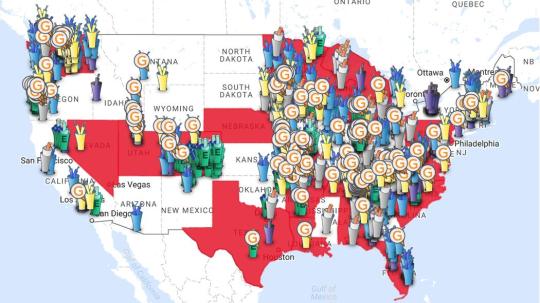feminismandmedia:
aka14kgold:
butts-bouncing-on-the-beltway:
redmagus77:
kaylapocalypse:
thatadult:
The Stanford prison experiment tapes were so stupid when I watched them in AP psych and so stupid when I watch this film about them. Literally they could’ve all sat and played cards and got $15 a day to tell ghost stories all day and be best friends. But masculinity and whiteness and power created this violent irrationality that positioned young ass men to be met with brutality and trauma and disrespect even when it was obviously taken too far. and it makes no sense. If someone put me in a room with Black girls and said I would get paid $90 a day (that’s the equivalent apparently) to be a prison guard, do you know how fast I’d be sitting with them and learning about them and exchanging Instagrams and like.. sleeping.. like what the fuck was the point of any of that…
My psych teacher introduced us to this study and literally before she showed us was like “don’t ever confuse a study based on one type of person (white men/boys) to be an example of an Everyman situation. There is strong evidence that if this was recreated with diversity, or even just with girls, that the results would have been drastically different. This is an example of bias and sexism in the medical research community.”
“Other, more subtle factors also shaped the experiment. It’s often said that the study participants were ordinary guys—and they were, indeed, determined to be “normal” and healthy by a battery of tests. But they were also a self-selected group who responded to a newspaper advertisement seeking volunteers for “a psychological study of prison life.” In a 2007 study, the psychologists Thomas Carnahan and Sam McFarland asked whether that wording itself may have stacked the odds. They recreated the original ad, and then ran a separate ad omitting the phrase “prison life.” They found that the people who responded to the two ads scored differently on a set of psychological tests. Those who thought that they would be participating in a prison study had significantly higher levels of aggressiveness, authoritarianism, Machiavellianism, narcissism, and social dominance, and they scored lower on measures of empathy and altruism.”
http://www.newyorker.com/science/maria-konnikova/the-real-lesson-of-the-stanford-prison-experiment
The thing about this study is that whether or not it’s generalizable to the public is debatable at best.
But it’s certainly generalizable to the population of people who tend to be drawn to prison system and law enforcement jobs because that’s exactly the demographics that tend to show up in those positions.
“But it’s certainly generalizable to the population of people who tend to be drawn to prison system and law enforcement jobs because that’s exactly the demographics that tend to show up in those positions.”
@half-crazedauthor
It is worth noting that, in fact, the BBC replicated this experiment in 2001 with very different results. Instead of recruiting volunteers for a psychological study of prison life, they advertised the experiment:
“It asked ‘Do you really know yourself’ and asked for men to take part in a social science experiment to be shown on TV. It warned that the research would be a challenge and involve ‘hardship, hunger, solitude, anger’.
In the case of the BBC Prison Experiment, the mock prison did not devolve into the torturous, abusive hellishness of the Stanford Prison Experiment–even though the experimenters very deliberately attempted to create conditions that would destroy cohesion among the prisoners and encourage authoritarian behavior from the guards. Prisoners were told that they might be able to be promoted to guardhood in an effort to keep them divided, shaved upon entry to the prison, and the guards were encouraged to create the rules of the prison and enforce them in any way they saw fit.
It’s important to note that one of the very first things the experimenters noted was that the guards were, at the very outset, uneasy about the status differences between themselves and the prisoners and conscious of their power.
Because food–both quantity and quality–were very salient and powerful status treatment differences in the prison, there was almost immediately a showdown over food. (Prisoners were fed much, much smaller and worse-tasting food than the guards, and indeed prisoners were made to serve the guards their meals and watch them eat in part so everyone would be aware of these status issues.)
The guards almost immediately felt guilty and attempted to share their sausages with the prisoners by giving them the guards’ leftovers… and the prisoners immediately go “not until we consult with the other prisoners,” and then collectively decide to refuse absolutely to take small rewards from guards in lieu of the right to good food.
Guards tried repeatedly throughout the study to get prisoners to see them as basically equal, bar the circumstances of their current positions; prisoners instead repeatedly pointed out the actual circumstances of their current situation placed them at very different power levels indeed and insisted that guards actually change the system in order to make the conditions fair and equal. In general, prisoners quickly and collectively exploited the guards’ shame at the unequal conditions in order to receive fair treatment.
At this point, out of curiosity, the experimenters introduced a new prisoner into the system, one who had been trained as a trades unionist…
….and this unionist prisoner quickly chose to approach a disaffected guard, empathize with his unhappiness, and turn the blame for the situation at the unequal and unfair conditions set in the prison. Those conditions, of course, were set not by the guards–they were set by the experimenters. The very first thing, then, that this unionist does is build bridges to unify all the people in the prison.
Prisoners steal the guards’ keys; guards choose instead of “cracking down” or punishing the prisoners to ask politely for the prisoners to help them find the keys, and cheerfully accept them when provided. This gives prisoners leverage for a negotiation, which is then deftly picked up by the experienced negotiator (although not without some pushback from another charismatic and decisive prisoner).
Here’s what the negotiator had to say:
Negotiations begin. pDM outlines the forum proposal. One of the Guards points out that the Prisoners are asking to be rewarded for stealing the keys. pDM responds by outlining a stark choice. Certainly the Guards can refuse to accept his plan, but the alternative is a return to conflict: “It’ll not be the keys tomorrow, it’ll be something else. It’s a game. All I’m saying is that there is a way to resolve that game”.
pDM is confident. He knows he speaks for the Prisoners. The Guards, even in their own mess, are despondent. They know that they can’t handle the Prisoners. And so they accept the new order. Even if they have given up much of their power, at least this system might work and offer them some respite:
gTM: I’m in high spirits after that.
gBG: It actually went alright. This geezer is alright. We can all deal
with him.
At this point, experimenters withdrew the negotiator to see what would happen to the egalitarian vision he set out. As it turned out, the prisoners peacefully overthrew the rule of guards (by, effectively, mounting a sitdown protest in the guard’s sanctuary) and decided instead to organize an egalitarian commune for the remainder of the experiment.
so OP’s really not that far off the mark!
So literally the only thing the Stanford experiment proved is “all cops are bastards,” and the followup demonstrated that, in the absence of bastards, socialism works?






















